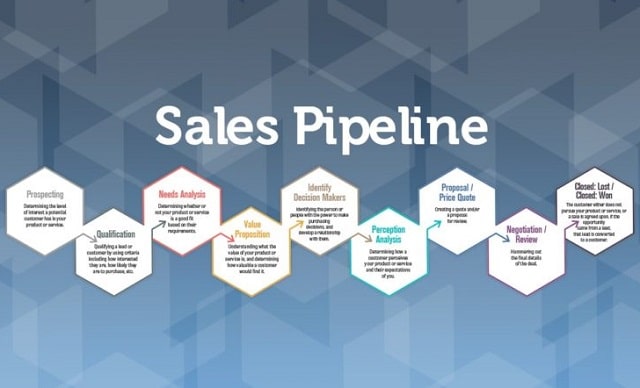
One common pitfall in nurturing a sales pipeline is the ineffective use of marketing strategies, such as email campaigns. For instance, a poor design of email can significantly hinder the effectiveness of these campaigns, causing potential leads to disengage before they even reach the sales team. Evaluating and refining email marketing strategies with the help of professionals is crucial to ensure they resonate with the target audience and drive the desired action.
In addition to refining email marketing strategies, below are some key strategies for building a strong sales pipeline.
Understand The Target Market
To truly unlock the potential of a sales pipeline, businesses must delve deep into understanding their target market. This goes beyond simple demographics to encompass a thorough analysis of behaviors, preferences, needs, and challenges that potential customers face. Comprehensive market research and data analysis allows companies to construct detailed buyer personas. These personas serve as archetypes representing the ideal customer, guiding tailored marketing and sales strategies.
By aligning offerings with these personas' specific needs and pain points, businesses can enhance engagement and foster stronger connections with potential clients.
Craft Compelling Value Propositions
After identifying the target market, the crucial next step is formulating value propositions that resonate deeply with potential customers. These propositions should convey the unique benefits and differentiators of the product or service, setting it apart from the competition.
Effective value propositions address the specific needs and desires of the target audience, highlighting how the offering can solve their problems or enhance their lives. This clarity in communication is vital in capturing prospects' interest and facilitating their journey through the sales pipeline, ultimately leading to higher conversion rates.
Leverage Multichannel Marketing Strategies
The modern consumer landscape is characterized by its diversity in communication channels, necessitating a multichannel marketing approach for businesses aiming to maximize their reach. This strategy encompasses a broad spectrum of platforms, from digital avenues like social media, email, and content marketing to traditional mediums such as direct mail and in-person networking events.
To be effective, each channel must be carefully curated to present a unified, personalized message that resonates with the target audience. By adopting a multichannel strategy, businesses can ensure they meet their prospects where they are, significantly increasing the chances of engagement and conversion.
Implement Lead Nurturing Programs
Lead nurturing programs are essential for cultivating potential customers who are not yet ready to commit. These programs are tailored to maintain engagement with prospects by offering them relevant, valuable content and resources that cater to their evolving needs and interests. By consistently providing support and information, businesses can stay at the forefront of prospects' minds, gently guiding them through their buyer's journey.
Effective lead nurturing fosters trust and credibility, making it more likely that when the prospect is ready to purchase, they will turn to the company that has been with them every step.
Utilize Technology And Automation
In the fast-paced sales world, leveraging technology and automation is non-negotiable for maintaining efficiency and competitiveness. Customer Relationship Management (CRM) systems are at the heart of this technological revolution, enabling businesses to keep detailed records of prospect interactions and progress through the sales funnel.
Automation extends this capability by taking over routine tasks such as sending out scheduled emails and updating social media, freeing up the sales team to concentrate on more complex, high-value activities. This synergy of technology and sales efforts streamlines processes, ensuring no opportunity is missed due to oversight or human error.
Ensure Continuous Measurement And Optimization
The dynamism of the sales environment requires a strategy of constant vigilance and adaptability in managing the sales pipeline. Establishing and monitoring Key Performance Indicators (KPIs) allows businesses to gauge the health and efficiency of their sales processes. Analyze this data to illuminate areas of stagnation or inefficiency, pinpointing where interventions are needed.
Also, regularly refining strategies based on empirical evidence ensures the sales pipeline remains agile, responsive to changes in the market, and aligned with organizational goals, thus safeguarding its effectiveness over time.
Build A Sales-Focused Culture
Creating a culture that prioritizes sales across all levels of the organization can dramatically amplify the effectiveness of the sales pipeline. This cultural shift entails aligning every team member's objectives with the broader sales goals, ensuring a unified effort toward growth.
Investing in training and development ensures that all employees, not just the sales team, understand their role in the sales process and possess the skills to support it. Lastly, encouraging collaboration and exchanging ideas fosters a sense of ownership and commitment to the company's success, driving innovation and excellence in sales strategies.
Takeaway
Building a strong sales pipeline is a critical component of business growth. It requires a strategic approach that encompasses a deep understanding of the target market, compelling value propositions, multichannel marketing, lead nurturing, and the effective use of technology. Continuous measurement and optimization and a sales-focused culture ensure the pipeline remains efficient and productive. By implementing these strategies, businesses can unlock growth and secure their position in the competitive market landscape.
